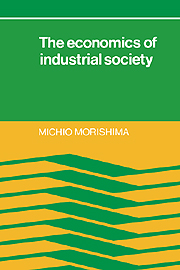5 - The modern industrial society
Published online by Cambridge University Press: 21 January 2010
Summary
An outline of the model
A model of the industrial state lacking natural resources
Macro-economics is a theory which reveals the structure of national economies and teaches us about the way they operate. Since economic structures are complex and differ from country to country, it will be necessary in what follows to make both simplifying and characterizing assumptions. Simplifying assumptions are those which make discussion simple and the analytical perspective clear; characterizing assumptions are those which remove extraneous factors so that we can isolate the special characteristics of an economy. But if an assumption, however much it may simplify an argument, essentially alters the course of the reasoning and if it appears to produce a substantial change in the conclusions, then we can no longer regard this as a simplifying assumption. Simplifying assumptions do not alter the essence of the argument, nor do they affect the conclusions. They are neutral in the sense that they merely simplify a complicated discussion.
In contrast to this, a characterizing assumption is one which, while illuminating the special features of the economy about which it is made, allows us to pursue a course of analysis that is only valid under the assumption, and to draw particular conclusions on the basis of it. The postulate, for example, that ‘the economy operates under a free enterprise system (that it is a capitalist economy)’, is a characterizing assumption.
- Type
- Chapter
- Information
- The Economics of Industrial Society , pp. 135 - 176Publisher: Cambridge University PressPrint publication year: 1985



